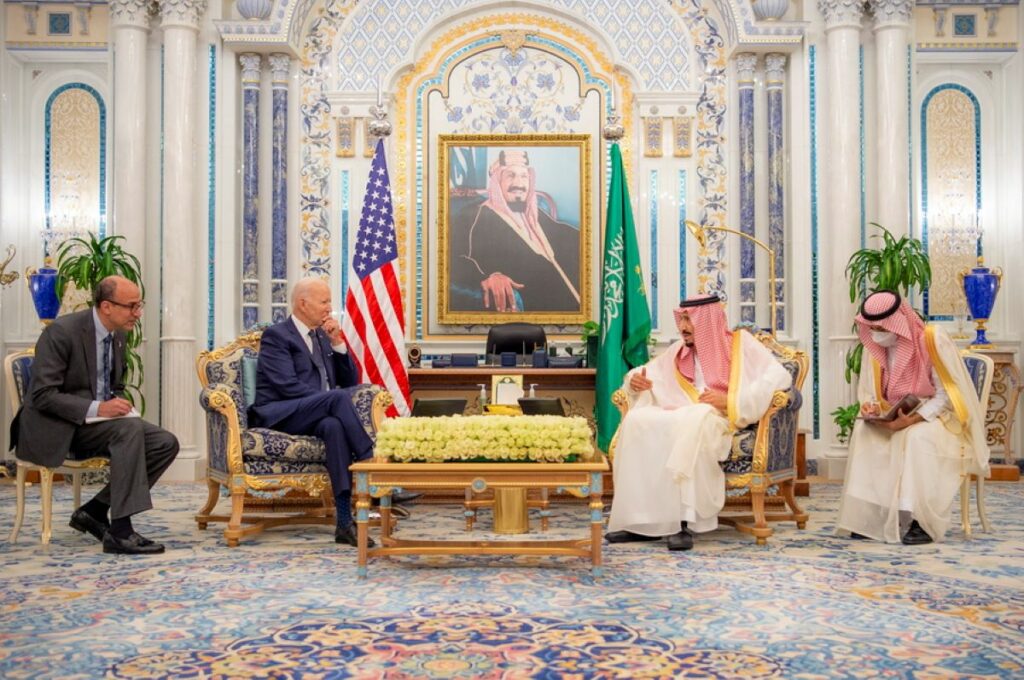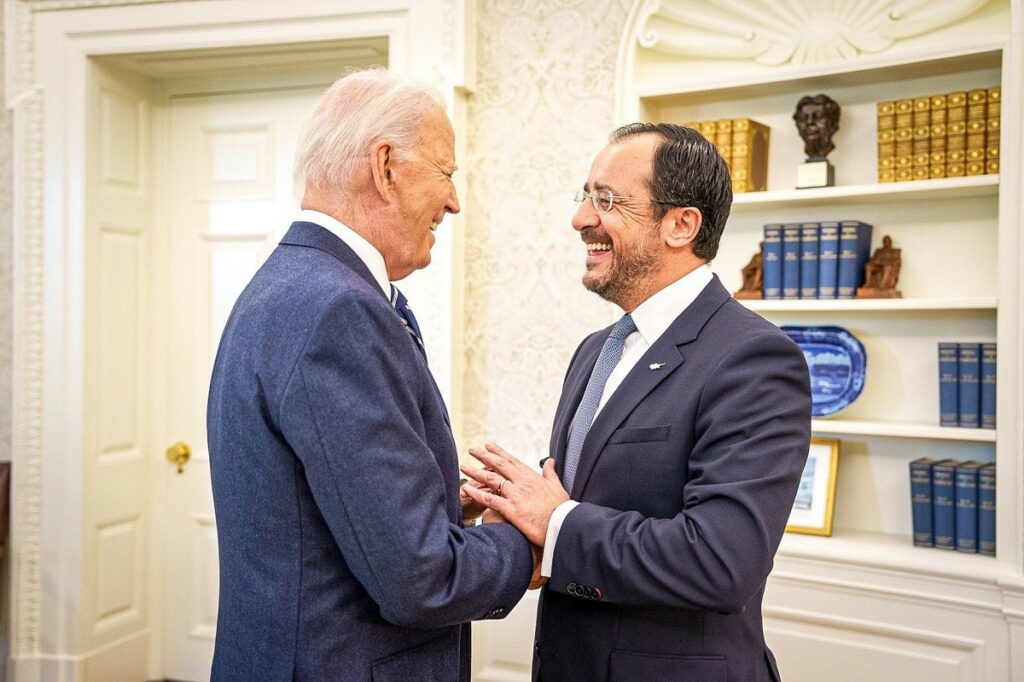
Why has the Presidential trip to the Middle East failed? The trap of a “win-win” situation in U.S. foreign policy

FILE PHOTO: A handout photo made available by the Saudi Royal Court shows Saudi King Salman bin Abdulaziz Al Saud (C-R) meeting with US President Joe Biden (C-L) during a meeting in Jeddah, Saudi Arabia, 15 July 2022. EPA, BANDAR ALJALOUD HANDOUT
By ALEXANDER DRIVAS, Strategic Analyst
The so-called multipolar order had replaced the unipolar moment before the mainstream voices of the West found the multipolar order with the ruins that the Russian invasion provoked.
Samuel Huntington is well known for describing the world after the Cold War. He named the international system a “hybrid uni-multipolar world”. On one side, there was the U.S. superpower and on the other side, powers that were in a redemption period but none of them could pose direct threats to the American dominance.
Time is always the enemy of empires and superpowers. From a realistic perspective, it is absolutely natural that a superpower declines at the same time as other powers grow. That kind of zero-sum game is related to the long-cycles theory (Kondratieff, Rosecrance, Goldstein, etc) and the U.S. is not the exception to the impact of those cycles.
- The workable goal for the U.S. is to remain as a power that guarantees a space of democracy and prosperity, but not the entire world. What Biden’s meetings in the Middle East unfolded should be a lesson for American foreign policy.
Exploring the U.S. foreign policy in the Middle East could present a case study that depicts the points that American officials need to correct. President Biden met with many officials during his visit to the Middle East and gained almost nothing. An obvious question is raised. Why a superpower can’t gain benefits of strategic importance from countries that are middle powers? Answering that question is difficult, but there are still some ideas.
The U.S. foreign policy after WWII had been shaped by the sudden needs that were raised after the break-up with the USSR. Putting aside its contradictory core, Monroe Doctrine had a massive impact on the American public, making it reluctant to any U.S. severe engagement across the two oceans. It holds true that the so-called strategic ambiguity depicts nothing but the American effort to escape from its external duties.
Nevertheless, strategic ambiguity means that American officials are traditionally feeling that have plenty of room for reaction. In other words, the essential keyword that gives everyone an accurate description of the U.S. foreign policy is “reactive”. But being reactive brings more fallacies. First and foremost, it reveals the absence of strategic planning in terms of foreign policy. Secondly, it implies that the U.S. can hardly understand the foreign policy of others.
During Clinton’s tenure, the Washington establishment tried -unsuccessfully- to fill that void with “globalization”. Even eight years ago, U.S. policymakers were not sure that China was the biggest challenger to the American primacy in world politics. Last but not least, the adoption of a reactive approach in world politics makes the State Department use frequently the card of appeasement.
- The connection between the passive approach and appeasement is clear; The other factors can easily grasp that the U.S. doesn’t want to get into trouble so they can pay for their calmness. These arguments could shape the wider framework under which President Biden brought almost nothing to Washington after his trip to the Middle East.
Another American misreading of shaping foreign policy could be easily identified by a European. Unfortunately, the Americans separate economics from politics. In the Middle East, all countries have special relations with China in terms of trade. For years, the U.S. has been stressing that the American military basin in countries like Qatar and Saudi Arabia was fortifying for the U.S. the exceptional position in Gulf States’ strategic prioritizing. Same mistake in Europe.
The U.S. was paying billions for European security while Germany was building a strategic relationship with Russia, which was already known for its “weaponization of energy”. It was under President Obama’s tenure that the U.S. was ready to get rid of Israel and invest once and for all in Erdogan’s Turkey.
Barack Obama was almost excited about Erdogan’s statesmanship until Erdogan signaled that he was nothing else but a brutal dictator who embraces radical ideas about the Middle East. Presuming that a Saudi prince studies how the U.S. behaved toward Israel, then, what he should do? Nothing except exploiting the U.S. and believing that the U.S. is an unreliable partner.
It is necessary to unfold more about the mindset of failure that causes embarrassing trips like the recent of POTUS’. During a period that the War of Ukraine is shocking every state, and the CIA insists that China will try to imitate Russia in Taiwan, the State Department is trying to make an attempt at the slightest chance to succeed.
On the first side, to guarantee Israel’s existence and, on the other hand, to bring Iran closer to the West. The win-win mindset in an ironic manner brings loss-loss. From where all these are coming from? The American insecurity that every state in the world should be close to the U.S., is proof that the State Department suffers from a lack of strategy. Questions such as “what are the pivotal states in a region?”, “who is the friend and who is the adversary?’’,
“What are the projections of the internal affairs of the states?”, and “what states are already lost cases and we try in vain to bring closer to Washington?” should be put as the prelude to the restoration of the American foreign policy.
- The ghost of overstretching is as dangerous as the isolationism’s one. Implementing policies that respond to “you can have your cake and eat it too” are dangerous and do not justify the surplus of the American power.
Moreover, the U.S. should take as given that states like Turkey and Iran are using the current multipolarity in order to blackmail the U.S. So, what would be a choice of the lowest risk? Let them go. George Kennan’s wisdom was based on selective engagement. In conclusion, the U.S. shouldn’t be trapped by being everywhere.
A possible counterargument from the appeasing and reactive group of the State Department might be that “China will seize the opportunity and it will augment its influence on those countries.”.
The point is exactly this; To make China be overstretched and to be trapped into promises that couldn’t face by states that are opportunistic. The U.S. should support states that are real allies and have no option but to keep them close.
Eventually, China will put them into a debt trap and they will get a wonderful taste of being Chinese or Russian allies. Finally, U.S. officials should get the big picture; Strategic planning in the multilateral era has to do more with running in a Marathon than running in a sprint.
Ακολουθήστε τη HELLAS JOURNAL στη NEWS GOOGLESakellaropoulou on 48- year anniversary since Turkish invasion of Cyprus

